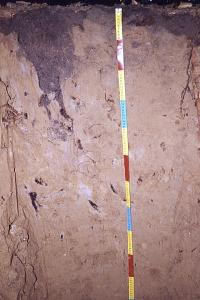Reference soil Germany 07:
Alisols occur in the tropics and subtropics, and in the warm temperate regions of the world in relatively young landscapes. The high level of exchangeable aluminium in these soils is caused by rapid weathering of secondary high-activity clays such as vermiculite and smectite.
Characteristics
Soils having an argic horizon (a subsurface horizon with distinct higher clay content than the overlying horizon), which has a cation exchange capacity of 24 cmolc per kg clay or more, and which starts either within 100 cm from the soil surface, or within 200 cm from the soil surface if the argic horizon is overlain by loamy sand or coarser textures throughout. They have "alic" properties (high content of exchangeable aluminium) in the major part between 25 and 100 cm from the soil surface; moreover, only such diagnostic horizons as an ochric, albic, andic, ferric, nitic, plinthic, or vertic horizon are present.
Reference soil DE007: Alisol
An imperfectly drained soil, derived from heterogeneous glacial till. The disturbed Ah2 is mainly coloured 10YR 4/4 and 10YR 4/2 and has irregular pockets of various A material. The Ah1 (rich in humus, eluvial horizon) has some bleached sand grains. In the Bt1 there is a coloured zone (10YR 5/2) with a fringe of strong brown (7,5YR 5/6) along coarse root channels. The main clay illuviation is found at a depth of 75-100 cm. (additional climatic data: insolation (hrs))
Classification
| WRB 2014 | |||
|---|---|---|---|
| Alisol |
| Local classification: | Parabraunerde |
